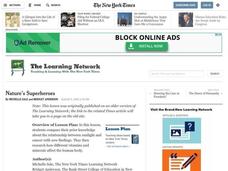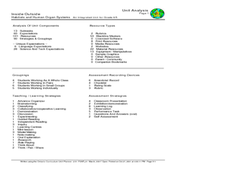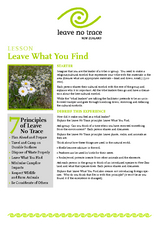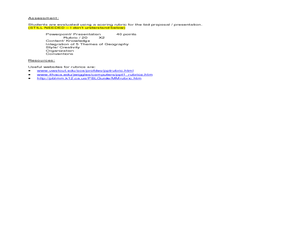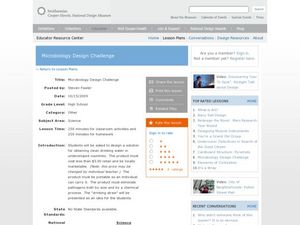Curated OER
Nature's Superheroes
Students compare their prior knowledge about the relationship between sunlight and cancer with new findings. They research how different vitamins and minerals affect the human body.
PBS
Ebola Outbreak
As of April, 2016, more than 28,000 suspected cases of Ebola were recorded in Western Africa with over 11,000 human deaths. Classes discuss the Ebola virus outbreak in 2014 and then groups develop an action plan based on...
Curated OER
Inside Outside: Habitats and Human Organ Systems
Young scholars examine the way habitats and human organ systems function. In groups, they role play the role of a government group assigned to determine if a settlement can make their home in a specific area. They must discover how...
Nuffield Foundation
Assessing Human Hearing
Young scientists explore hearing through multiple experiments, demonstrations, and activities. They focus on the changes in hearing over a lifetime, how we can determine where a sound is coming from, and the ability to filter noises.
Howard Hughes Medical Institute
Lactose Intolerance: Fact or Fiction
Around the world, about 2/3 of adult humans are lactose intolerant. Scholars work in small groups to discuss a few statements about lactose intolerance. Then, they watch a video on the topic and readdress each statement. Whole-class...
Curated OER
The Human Organism
Students identify their feelings and learn constructive ways of handling conflict. For this feelings and conflict lesson, students read a story about conflict and identify ways to understand emotions and resolve conflict.
Howard Hughes Medical Institute
Got Lactase? The Co-Evolution of Genes and Culture
Does the human body evolve as quickly as human culture? With a stellar 15-minute video, explore the trait of lactose intolerance. Only about 1/3 of human adults seem to still have the enzyme lactase and therefore, the ability to digest...
Curated OER
"Water is Life" Global Water Awareness
Learners examine and calculate the percentage of potable water remaining on the earth. In this ecology and geography lesson, students brainstorm the main factors affecting water distribution. Learners use mathematical problem solving to...
Curated OER
The Day an Egg Solved the Mystery of the Cell
Students conduct an experiment comparing human cells to chicken cells. In this cells lesson plan, students conduct an experiment to see how nutrition moves through cells and how to better take care of their bodies.
Curated OER
Consider The Source
Students learn about the largest natural and human sources of air pollution to become aware of these components in their surrounding environment. In this environmental instructional activity, students read and describe natural sources...
King Country
Lesson 2: Private & Public
What is the difference between a private and a public place? The focus in this second lesson on family life and sexual health is building an understanding of the difference between the concepts of private and public and the...
Earth Day Network
Staying Green While Being Clean
Clean up the environment with a lesson plan that focuses on replacing hazardous cleaning supplies with green, environmentally-friendly products. Using a dirty patch of surface as a control area, kids clean other parts of various...
Curated OER
Raw Seafood ~ On the Half Shell
The topic is fascinating, but there is not much for learners to do here. Food borne illness has always been a problem for humans to face, and here, data from the Center for Disease Control is analyzed. Learners look at the number of...
Curated OER
The Good Microbes
Some microbes are beneficial for humans. This resource asks learners to identify beverages that contain healthy microbes. There are six beverages shown, and pupils must place a check mark next to the ones they think contain healthy...
Curated OER
Leave What You Find
Young scholars explore environmental awareness by participating in a role play activity. In this cultural analysis instructional activity, students discuss the importance of symbolism when referring to a tribe and create their own tribe...
Curated OER
Middle Childhood and Early Adolescence
Students become familiar with body changes during puberty. In this stages of human development lesson, students review the stages of development from 1-5. Students read an article called I'm Growing but Am I Normal? and...
Curated OER
Environmental Health Hazards and Children
Learners are introduced to the environmental hazards their community is facing. In groups, they develop a list of the ways humans have changed the Earth and how these changes have lead to environmental hazards. They record their...
Curated OER
Amazing Grazing: Keeping Our Ecosystem Running
Students discover the value of sustainability within our ecosystem. In this ecological lesson, students discuss the importance of a food cycle in our society, and how humans can improve the conservation of a healthy ecosystem. Eventually...
Curated OER
Who's Up for the Olympic Challenge?:Integrating the 5 Themes of Geography with Olympic Bids
Students explore geographical themes. In this problem solving geography lesson, students view a PowerPoint presentation about the Vancouver/Whistler Olympic bid. Students analyze Vancouver as an Olympic site looking at...
Curated OER
Radiation Reassessed
Learners investigate the dangers of radiation by exploring recent nuclear tragedies. In this scientific debate lesson plan, students define the idea of radiation "half life" and determine if low doses of radiation are truly...
Curated OER
The Meat-Packing Industry in Chicago During the Progressive Era
Students examine maps showing the hog and corn distribution of the United States. In groups, they research the reasons why Chicago became the natural hub for meat-packing processing in the United States. They examine changes in...
Curated OER
Microbiology Design Challenge
Students discover dangers to human health by researching what's in our drinking water. In this water purification instructional activity, students discuss the conditions of water in undeveloped countries and why it is unsafe to...
Pennsylvania Department of Education
The Digestive System
Fourth graders simulate how the digestive system works. In this hands-on simulation, 4th graders complete six group activities that help students visualize how our body breaks down food into nutrients.
Curated OER
Health Benefits of Rice
Sixth graders examine the health benefits of rice. In this food benefits lesson, 6th graders discover the nutritious benefits of rice. Students research Celiac Sprue disease and how rice benefits the people with this disease.
Other popular searches
- Philosophy of Human Nature
- Democracy and Human Nature
- Essays on Human Nature
- Human Nature Hobbes
- Human Nature Good
- Enlightenment Human Nature
- Human Nature in Plays
- Human Nature Environmental
- Poetry on Human Nature
- Aristotle Human Nature
- Human Nature Enviromental


